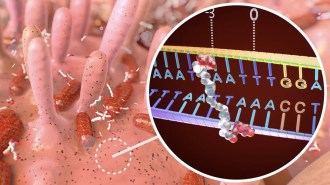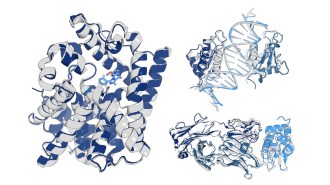A technique that encapsulates cells in polymer might someday benefit people who receive pancreas-cell transplants for diabetes, researchers say.
In type 1 diabetes, the immune system destroys insulin-producing cells in pancreatic-cell clusters called islets. Patients then must inject themselves regularly with insulin to control blood glucose.
An experimental treatment that transfers a deceased donor’s islets to another person can reduce the need for insulin, but the recipient must continuously take immunosuppressive drugs—which have serious side effects—to prevent the body from rejecting the transplanted cells.
Shielding the islets from the immune system might ease this problem, says chemist Milan Mrksich of the University of Chicago. For example, a polymer coating that lets the insulin molecules, which are small, flow out while blocking the entry of larger immune system molecules, “might be able to maintain function of the islet but mask the islet from the recipient’s immune system,” he says.
However, islets vary in diameter. Prior coating efforts gave larger islets thin layers and smaller islets thick layers, and those variations altered the islets’ function, says Mrksich.
To make uniform coatings, Mrksich, physicist Sidney R. Nagel, surgeon Marc R. Garfinkel, and their University of Chicago coworkers use a technique called selective withdrawal. They start with a layer of water atop a layer of high-density oil. Within the water are islets from rats and the ingredients for a biocompatible polymer.
Applying suction near the upper boundary of the oil layer, the researchers draw off oil along with a small amount of water. The water, carrying islets, forms a thin stream within the flow of oil.
As the liquids travel down the suction tube, the water stream narrows to the point where it’s no wider than an islet. It then pinches off, leaving the cells suspended in oil but enclosed in a thin shell of water. Finally, the assembly line of islets encounters a laser, which forms the coat by initiating a reaction in the chemicals dissolved in the water, Mrksich says.
The researchers found that they needed to send cells through the device twice to ensure complete coverage of each islet.
The final uniformity of the coatings is “extremely remarkable,” comments physicist David A. Weitz of Harvard University. “Techniques to do that are really quite rare.”
The researchers found that the islets’ coatings blocked proteins slightly smaller than immune system molecules of concern but didn’t stop transport of molecules approximately the size of insulin. The coated islets’ release of insulin in response to changing concentrations of glucose was indistinguishable from that of uncoated islets, the team reports in the April Small.
The work “shows the potential of this technology,” says Elliot L. Chaikof, a surgeon and bioengineer at Emory University in Atlanta. He notes that the next challenge will be to scale up the procedure so that many cells can be coated at once. Experimental transplantations use about 10,000 islets per kilogram of a patient’s weight, he says. A single run-through of the Chicago team’s device coats 100 cells per hour.






